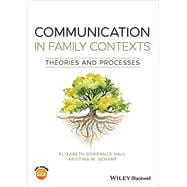An innovative, student-friendly textbook covering the major elements of the field of Family Communication
Family Communication, a rapidly growing sub-discipline within Communication Studies, explores the processes and factors involved in family interactions and relationships. Communication in Family Contexts is a clear and accessible survey of the essential principles, theories, and concepts of the field. Unlike textbooks that present a vast amount of material across only a few chapters—this innovative textbook features brief, easily-understood chapters ideally-suited for undergraduate courses on the subject.
The text provides concise yet comprehensive coverage of a diverse range of topics, from fundamental aspects of caretaking and sibling communication, to topics not covered in other textbooks such as estrangement and marginalization. 33 chapters cover theories of family communication, family communication processes, and communicating in family relationships. The authors, noted researchers and educators in the field, complement discussions of standard topics with those of growing contemporary interest, such as LGBTQ family communication, step-family and half-sibling relationships, and the influence of technology on family. This textbook:
- Provides a well-rounded examination of the major elements of Family Communication studies
- Explains the foundational theories of the field, including Family Communication Patterns Theory and Relational Dialectics Theory
- Features numerous practical application exercises to enable students apply theory to practice
- Includes a complete set pedagogical features, such as case studies, visualizations and models of theories, illustrations, and discussion questions
- Offers a flexible organizational structure that allows instructors to pick and choose chapters to meet the needs of their courses
Communication in Family Contexts: Theories and Processes is an important resource for instructors and students in the field of family communication, the wider discipline of Communication Studies, and related areas such as social psychology and sociology.
ELIZABETH DORRANCE HALL, PHD, is Assistant Professor in the Communication Department and a Director of the Family Communication and Relationships Lab at Michigan State University.
KRISTINA M. SCHARP, PHD, is Assistant Professor in the Department of Communication and a Director of the Family Communication and Relationships Lab at the University of Washington.
Preface xi
Meet the Authors xv
Meet the Case Study Contributors xvii
Acknowledgments xxi
About the Companion Website xxiii
Chapter 1: An Introduction to Communication in Family Contexts 1
Chapter 2: Research Paradigms and Methods that Inform Family Communication Research 7
Part I: Theories of Family Communication 17
Chapter 3: Affection Exchange Theory 19
Chapter 4: Communication Privacy Management Theory 27
Chapter 5: Family Communication Patterns Theory 35
Chapter 6: Family Systems Theory 43
Chapter 7: Narrative Theories 49
Chapter 8: Social Cognitive Theory 57
Chapter 9: Relational Dialectics Theory 63
Part II: Family Communication Processes 75
Foundational Processes 77
Chapter 10: Caregiving in Families 79
Chapter 11: Conflict and Forgiveness 87
Chapter 12: Coping and Resilience in Families 101
Chapter 13: Difficult Family Conversations 109
Chapter 14: Discourse Dependence 119
Chapter 15: Family Distancing 127
Chapter 16: Information Management and Disclosure in Families 137
Chapter 17: Supportive Communication in Families 145
Chapter 18: Uncertainty Management 157
Major Family Transitions 165
Chapter 19: Cohabitation and Marriage 167
Chapter 20: Delaying, Forgoing, and Transitioning to Parenthood 175
Chapter 21: Divorce and Dissolution 185
Chapter 22: Remarriage and Stepfamily Formation 193
Part III: Communicating in Family Relationships 201
Family and Relationship Types 203
Chapter 23: Communication and Adoptive Families 205
Chapter 24: In-Law Relationships 215
Chapter 25: Intergenerational Relationships 223
Chapter 26: LGBTQ Families 235
Chapter 27: Parent–Child Relationships 241
Chapter 28: Partner Relationships 253
Chapter 29: Sibling Relationships 263
Chapter 30: Voluntary Kin Families 271
Family Communication in Context 275
Chapter 31: Family Communication in Health Contexts 277
Chapter 32: Family Communication in Organizational Contexts 287
Chapter 33: Family Communication in Technological Contexts 299
Author Index 311
Subject Index 315

